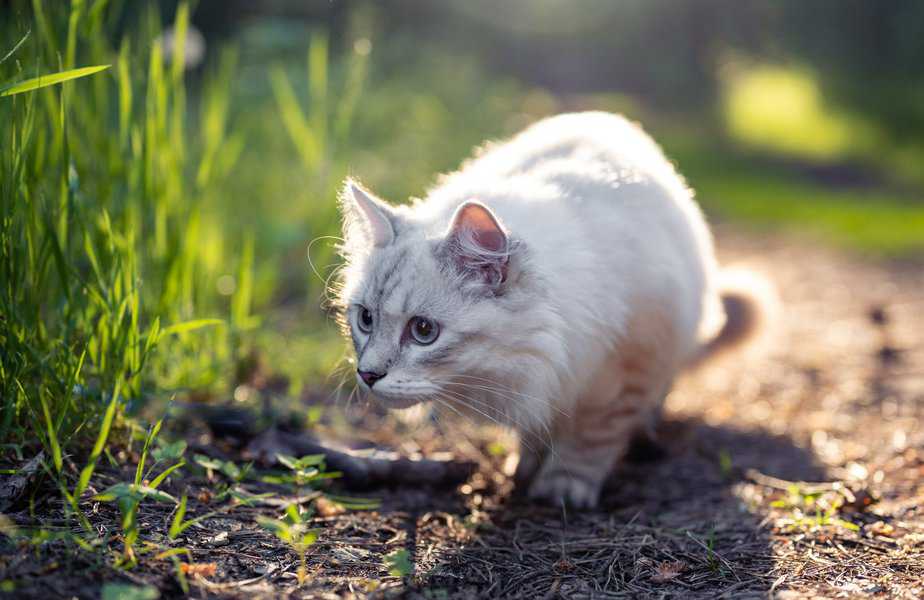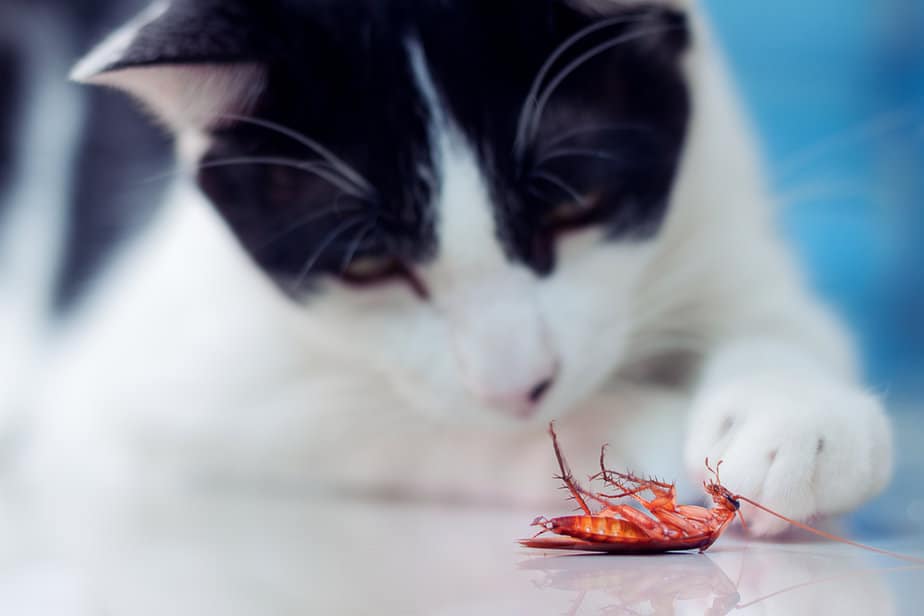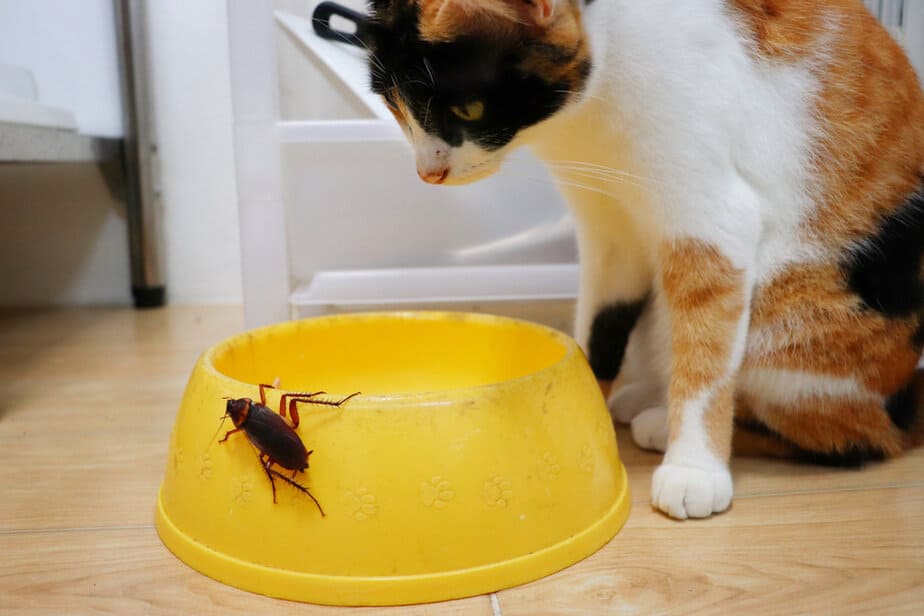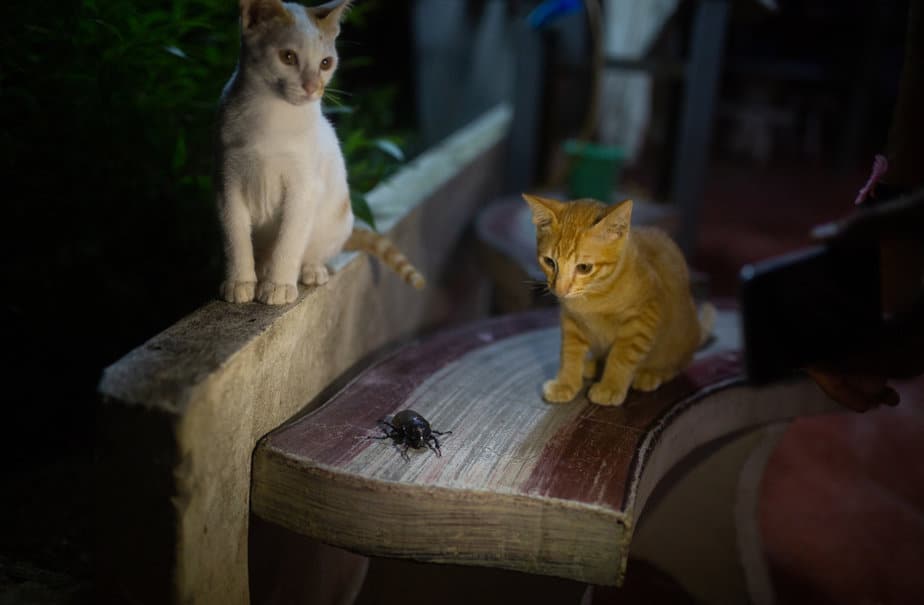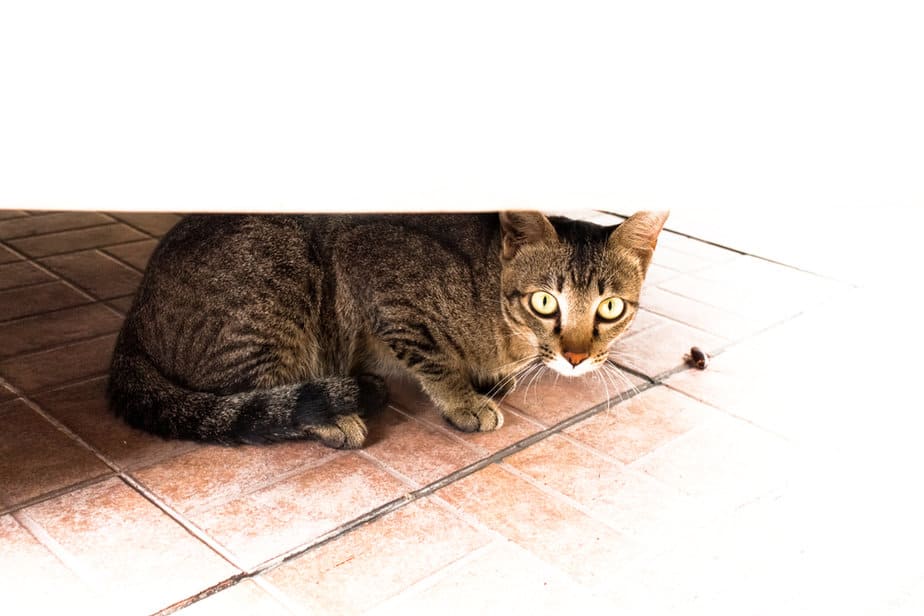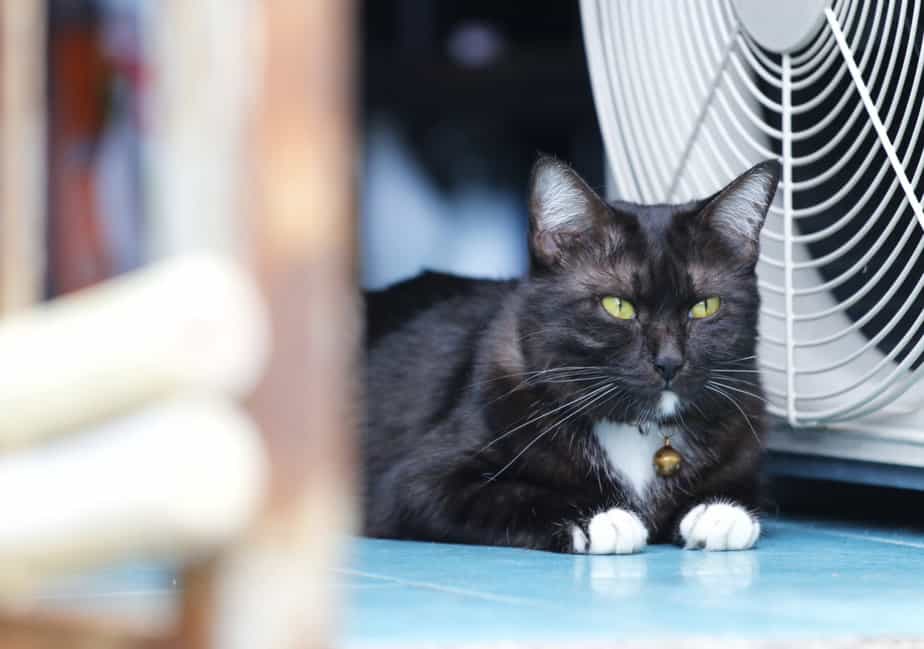📖 Table of Content:
Trust me, I happen to know just how disgusted you are at the thought of your cat munching on this insect. But can cats eat cockroaches?!
This shouldn’t really be a weird thing to ask, right? I mean, it’s only in their nature to hunt small things. Cockroaches aren’t that scary when you think of it. Or I just might be wrong.
Either way, it’s better than a dead bird waiting on your doorstep or something smellier than a cockroach! We all know how much our pets love to show off and master their skills. Even though they’re domestic cats, they still have a thing for hunting.
It’s rooted deep into their DNA and there’s no escaping from their predatory instincts. Well, I guess it’s a good thing then. It’s especially welcome and useful when you’re scared of cockroaches like I am. They’re just creepy and ugly, that’s all.
This really makes you think whether cats can eat cockroaches – and perhaps more importantly, why would they?! There’s nothing interesting about them and I bet there’s nothing tasty either!
These hard-shelled insects can’t be just fun and playtime for our furbabies! Is there something more to it than the plain quenching of boredom?
I know our cats are curious and sometimes I’m thankful for that. If it weren’t for her inquisitiveness, some roaches would still be lurking around my property!
Thankfully, there’s a new sheriff in town that’s going to put them back in their place. I didn’t actually know my furkid had it in her. All she seemed interested in was lounging on the sofa all day and munching on some cat treats.
I never thought my purrincess would be keen on getting her paws dirty! I guess I was wrong. Although I’m grateful that she’s keeping the bad guys away from me, it makes me wonder if it’s safe for cats to eat cockroaches.
Can cats eat cockroaches?
Well, if you’ve ever seen a cat in action, then I presume you know the answer to this question. They’re highly skilled and can catch their prey in a matter of seconds. Some people wouldn’t call a roach a catch, but it means a lot to me!
And I just know how proud my cat is when she kills something for me. It’s like her way of saying: “Thank you for everything you do for me.”
Actually, she’s too much of a spoiled brat to think that way. She’s probably thinking how I’m the incapable one and she has to take care of me.
Either way, I’m happy with either scenario as long as the outcome signals the eradication of that cringey critter. It’s really just one of the many benefits of having a cat around.
We know that cats are capable of killing a cockroach and more than that. However, the real question is should they eat it, and what happens if they do?
You see, I wouldn’t necessarily think of cockroaches as an ideal menu for a feline. It’s meaty, I guess? But that’s probably not the reason they’re after them. The good news, however, is that cockroaches aren’t poisonous to felines. Your furry buddy can go on a carefree search party for some roaches.
BUT – there’s that one but… The thing with roaches is that they’re not toxic as long as they aren’t sprayed with pesticides. I know this rings some alarm bells in your head right now. Therefore, I’d say that in most cases, cats can eat cockroaches without any problems.
Just be careful. Be extra cautious if you’re living in a city, in an apartment where there is regular cleaning of the building and apartments.
The roaches might be sprayed with pesticides and still running up and down that wall (they’re little diehards!) This could be potentially dangerous to your feline.
Why do cats hunt cockroaches?
As I’ve already mentioned, they’re not high-value cuisine to felines – there’s nothing particularly special about cockroaches. What they are is a great form of entertainment and exercise. Especially for kittos who spend most of their time indoors.
Physical activity is crucial for agile creatures like cats. It helps them stay fit and healthy, as well as happy. Apart from physical health, hunting also plays a major role in your cat’s mental health.
Every pet needs some mental stimulation from time to time. Toys become boring after a while, so your cat’s probably welcoming something more interesting. I don’t think we should call their weirdness into question.
Jokes aside, hunting is a part of their nature. As a carnivore, it’s the only form of survival they’re equipped for, and that works for felines. Therefore, don’t be surprised if your pet goes on a hunting spree.
Cockroaches may not seem like prey, but in your cat’s eyes, they’re the most valuable prize. Remember, felines don’t only hunt out of boredom or because they’re hungry.
Many furry companions will bring their prize and leave it at your doorstep. It may be a sign of gratitude and your pet thanking you for everything you do for her. But I think we know our pets better than that.
They’re probably thinking about how clumsy we are, and incapable of caring for ourselves. That sounds more likely, doesn’t it? But we’re used to them being superior to humans, so it makes perfect sense. Either way, their intentions are pure and guided by instincts.
Lack of nutrients
I know; I’ve just said how a cockroach doesn’t have that many nutritional benefits to your cat. However, she doesn’t know that and may try to eat it if she lacks some of it.
Felines and the rest of our pets will usually try to compensate for the lack of something by taking matters into their own hands. Of course, they can’t communicate it, but their instincts once again take over.
This may be nothing serious or be something even life-threatening. If your pet’s been acting weird lately and munching down on those roaches and searching for them more than often than not, she might be in trouble.
You don’t have to be an expert to notice when your pet’s out of sorts. Therefore, don’t hesitate, but rush to the nearest animal clinic. It might be just a nutrient deficiency. Still, we wouldn’t want to risk something developing out of that.
Inspect closely each time your furry companion catches a bug and try to notice just how much she is obsessed with it. Your keen observation just might get her out of a lot of trouble.
Are cockroaches toxic to cats?
Their hunting instincts aside, felines can sometimes make poor judgments. It’s not unusual to see those video clips of little feisty cats giving it a go with a black bear!
I know, such brave hearts they are. But we must admit they sometimes bite off more than they can chew, figuratively and literally speaking.
Speaking of cockroaches, they aren’t poisonous to felines as such. However, there are some hidden dangers this hard-shelled insect holds.
You wouldn’t think there’s anything hazardous regarding this bug as they seem to be your pet’s favorite. She thinks yummy, but we think disgusting.
If you’re living in the countryside, it’s likely cockroaches pose no harm to your cat’s health. However, the ones living in the concrete jungle just might be troublesome.
We all know that life in a rural area is healthier than in a crowded city. And the same goes for roaches. The healthier the environment, the healthier the bugs.
Unfortunately, not everyone has the privilege to roam freely in nature’s playground. This raises the chances of your pet coming across contaminated “prey” such as cockroaches.
1. Risk of pesticides
Humans usually don’t have a particular liking for these insects. Unlike cats, we tend to resort to different methods to get rid of them, ones including the least contact possible. Because we’re not as brave as our furry family members, we often use pesticides and insecticides to keep them at bay.
Roach infestations are a huge concern to our health because they can easily and more quickly than not contaminate our food and living place. Moreover, they’re capable of doing structural damage and destroying your home.
But what’s even more dangerous is the pace at which these little monsters can make your health decline. If you’re vulnerable to a roach invasion, you’re at risk of contracting E.coli, salmonella, and even asthma.
Honestly, they may be small, but they deliver quite big punches. So what happens when you google “Can cats eat cockroaches” and find out they may carry all sorts of diseases? It makes your head spin because now you remember all those times your pet hid in the corner dealing with this monstrous insect.
Unfortunately, you have every right to be scared. Pesticide toxicity isn’t that common but can definitely occur among cats. These are some strong chemical compounds that can seriously harm your pet’s health. Sure, cats can eat cockroaches, but will there be any consequences?
Sad to say, but eating cockroaches for fun can turn out to be not so fun. Some of the poisoning symptoms can include vomiting, diarrhea, and fever. In some cases, even tremors and seizures.
Muscle weakness, as well as respiratory arrest, can easily occur if your feline ingests enough of these chemical compounds. To prevent this from happening, make sure you use more cat-appropriate remedies.
If you can’t do that, keep your cat away from places infested with cockroaches. I know she’s only doing her job and trying to help. But this job shouldn’t be a life-threatening one.
2. Bacteria and parasites
As if cockroaches aren’t deterring on their own, here comes another surprise. Next to being filthy and able to contaminate your food, air, and living place, they have something else up their sleeve.
For instance, Capillaria, Toxocara, Eimeria, Ascaris, and others can all be carried by these awful creatures – and straight into your home. What’s even scarier is that these can make their way into your cat’s belly.
If your feline ingests an insect that’s infected with all of these worms, parasites, and bacteria, she may get into some serious trouble. This is why it’s extremely important that you regularly deworm your cat and take her for check-ups.
Some of the internal worms feed on their blood, so they can be the reason your pet has anemia. Ezcema, bacterial infections, digestive upsets, and intestinal blockages are only a few of the health issues caused by worms.
The next time someone asks you if cats can eat cockroaches just because they want their feline to do the extermination job for them, just explain to them how many vet visits would that take. Although it seems like a lot of help, it’s still not worth the risk.
Sure, you can’t really have an eye on your pet every minute of every day. Cockroaches are usually active at night when everything’s silent and everyone’s asleep. But that’s where the catch is (no pun intended) – our furry friends are nocturnal, too.
And behold the miracle, they have perfect night vision. Shout out to mother nature once again for making our pets the best creatures in the whole wide world. Woohoo!
3. Choking hazard
I just can’t seem to bring any positive news to you. I’m sorry, but I just hope you see how much of a hazard these little insects can be.
As cat parents, it’s our job to do thorough research and make sure we keep our pets safe. If all the bacteria, worms, and parasites weren’t enough to make you crazy, here’s something that will.
Not only can cockroaches create a struggle for your pet long-term, but these evil bugs might also give you the heart attack of your life. Roaches have an exoskeleton, a hard outer shell.
As cringey as it sounds, this is something that probably keeps your cat chewing on them. Thanks to their exoskeleton, they have the crunchy sound that your pet just might enjoy a bit too much. They look like such graceful animals, but seriously!
If your pet gets her paws on this one, things might take a turn for the worse. Just when she catches one and has him in her strong jaws, the roach might return the punch.
What I mean when I say this is that the exoskeleton may actually do its job and answer with some resistance. Because her teeth weren’t really made for crunching up insects, but rather bones and flesh, cockroaches might win this one.
The worst-case scenario is that your feline starts to choke on it. The hard shell can get stuck in her throat and restrict her breathing. This is why it’s best to let your cat show off by catching it, but take over before she tries to gulp it down.
What can I do if my cat eats cockroaches?
There’s really nothing much you can do. Once she gets her paws on this little insect, it would be hard to pry it off her. They’re such stubborn creatures and they value their prize over anything else.
No need to get frazzled about your cat eating one cockroach every once in a while. If you keep her health in check with regular deworming and consults with your vet, she should be fine.
The bacteria, parasites, and worms that cockroaches might transmit could easily be blocked off by those medications. However, it’s always better to be safe than sorry.
But how can you prevent these little pests from entering your home and disrupting your peace? Your pet surely won’t leave this battle unfinished. Therefore, make sure you get some repellents that aren’t harmful to your feline.
For instance, vinegar is something that might be useful in deterring these vile critters, yet doesn’t pose any real danger to your cat’s health. If this doesn’t work, you can always opt for organic pesticides and insecticides, but still keep a close eye on your pet, as some are still considered mildly toxic to pets.
Then, make sure she doesn’t go anywhere near the infested area. If she had to ingest a couple of roaches over the few days after having used these products in the home, it might not end that well for her.
Whatever you decide on, consult with your vet and see if she’s been properly dewormed and treated against particular parasites and pathogens. If not, these could seriously harm your pet, not to mention make your life a living hell.
Wrapping it up
Can cats eat cockroaches? Well, I know they can, but I’m just not so sure anymore that they should.
Felines are usually resilient; that’s something they should totally be proud of. But even these adventurous companions can sometimes land themselves in trouble.
Cockroaches usually don’t present any harm to your pet, but it doesn’t mean they can’t be a hazard. Your cat could potentially choke on them because of their hard shells.
Even more, they could carry certain parasites and diseases. And don’t get me started on those chemical compounds that might make their way into your feline’s tummy!
Related post: Can Cats Eat Flies? What Could Go Wrong With These Bugs?
